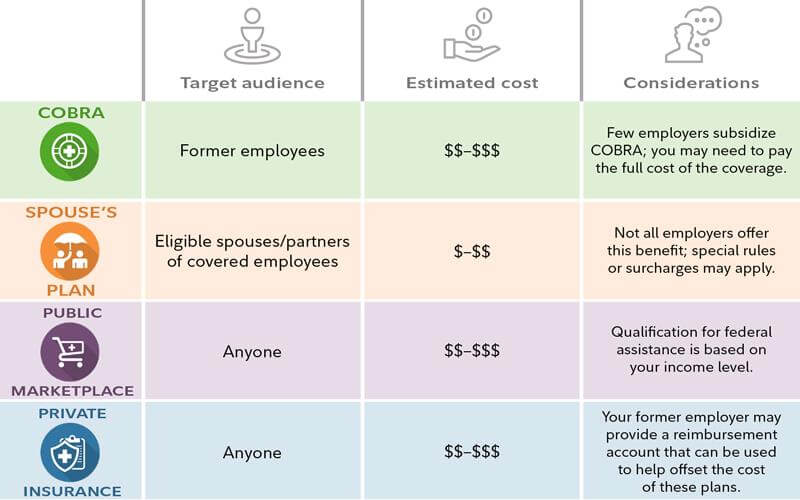Articles
Health Insurance Before Age 65
01.31.2022
“The pay doesn’t have to be the greatest if they have excellent health insurance.” That was me sharing my opinion with my husband Neil when he changed jobs recently. Since we got married in 2009, we have utilized health insurance through Neil’s work since his options were fantastic (and cheap!). And as many of us know, health insurance and health expenses can add up quickly.
So what do you do if you find yourself retired and without health insurance, especially if you retire before the magical Medicare age 65 (or if your spouse is under 65 and retired)? There are three primary options, each of which comes with its unique benefits and challenges. A fourth option, company-sponsored retiree health insurance, has become more of an exception than the norm. This article will address the three primary opportunities (assuming both spouses are retired).

- COBRA: If you are within 18 months of age 65, you may wish to utilize your company’s COBRA (Consolidated Omnibus Budget Reconciliation Act) coverage. Companies with more than twenty employees are generally required to offer COBRA health insurance. With this coverage, you maintain identical coverage as your employer plan. This coverage can continue for eighteen months post-retirement (or until Medicare eligibility, whichever is shorter). You, as the retiree, will most likely pick up the entirety of the premium costs, but the costs cannot exceed 102% of the plan costs for an active employee.There are nuances for COBRA coverage should you find yourself widowed or divorced and needing health insurance coverage. There are also additional rules for retirees with disabled dependents.
- Healthcare.gov / Marketplace / Obamacare: Whether you know it as Marketplace or Obamacare, the marketplace exchanges created by each state are the third primary option for health insurance if you retire before Medicare eligibility. The benefit of the marketplace is that there are no underwriting qualifications. In addition, the Marketplace exchanges offer premium subsidies and credits to reduce the costs; however, these subsidies and credits are based on the number of people in your household, household income, and the Federal Poverty Levels. As a result, marketplace premiums can become very expensive for folks with good retirement income or even modest levels of IRA/401(k) withdrawals.With Marketplace health insurance, there are opportunities for tax planning for many of our clients. Depending on the structure of your investment accounts and your cash flow, your Rather & Kittrell planning team may be able to help you minimize your premium costs.
- Private Policy: If you are healthy, some private health insurance policies may or may not suit your needs until Medicare eligibility. You will have to go through a health screening for a personal policy. Some cancers will automatically disqualify you until you meet specific timelines of being in remission. Additionally, these private policies will have to be renewed, with some being restored (contingent on health) annually, and some allow you to lock in for up to thirty-six months.
The post-retirement health insurance marketplace is not the easiest to navigate. While the three main options appear straightforward, you should sit down and consider each as a possibility. It would be beneficial if you thought through what is most important: cost or coverage. How long would you need coverage?
Here at Rather & Kittrell, we’ve helped navigate and explore all options. At times we will even sit down with our health insurance professional and lay out the options side by side. So let us see what opportunity fits your plan best so that you can enjoy your retirement!

Amanda Howerton, CFP®, CFDA® is an Adviser with Rather & Kittrell. Amanda is available at [email protected].